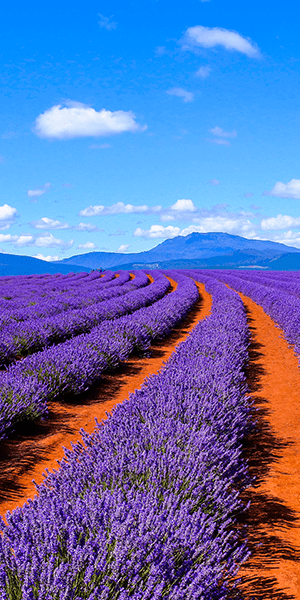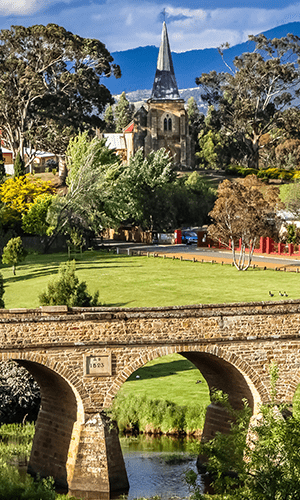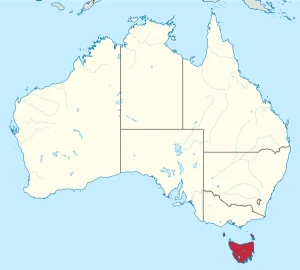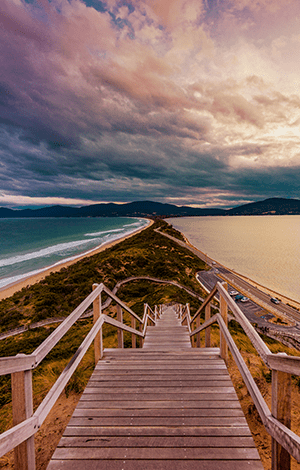Australia



Bridestowe Lavender Estate Located in Nabowla, Tasmania



Bridge and Townscape of Richmond in Tasmania


The Neck Lookout at Bruny Island, Tasmania
Tasmania
Tasmania, known affectionately as the “Apple Isle” for its rich agricultural heritage, this island state beckons with its pristine wilderness, dramatic coastlines, and unique wildlife. Tasmania lies southeast of the Australian mainland and is separated by the relatively shallow Bass Strait. It encompasses the main island of Tasmania, which is the 26th largest island in the world, along with over 1,000 smaller islands (both inhabited and uninhabited).
Tasmania’s allure is deeply rooted in its stunning natural landscapes. From the craggy peaks of the rugged Southwest Wilderness to the serene shores of Wineglass Bay, the state boasts an array of breathtaking vistas waiting to be discovered. Visitors can lose themselves amidst ancient forests, where towering trees create a cathedral-like canopy, or embark on epic hikes along the iconic Overland Track, immersing themselves in the pristine beauty of the Tasmanian wilderness. With over a third of the island designated as protected wilderness areas, Tasmania offers a sanctuary for nature lovers and outdoor enthusiasts seeking solace in its untamed beauty.
Beyond its natural wonders, Tasmania is steeped in a rich history and culture. The island’s colonial past is evident in its charming heritage towns, where sandstone buildings and cobblestone streets evoke a sense of nostalgia for a bygone era. From the historic port town of Hobart, with its vibrant waterfront precinct and world-class museums, to the convict ruins of Port Arthur, Tasmania’s history is woven into the fabric of its landscapes. Visitors can trace the footsteps of early settlers along convict-built trails or explore the island’s maritime heritage at historic lighthouses and coastal villages.
Tasmania’s appeal extends far beyond its landscapes and history, offering a wealth of experiences for every palate. Food and wine enthusiasts will delight in the island’s burgeoning culinary scene, where farm-fresh produce, artisanal cheeses, and world-renowned wines take centre stage. From gourmet dining experiences in Hobart to farm-to-table feasts in the fertile Huon Valley, Tasmania tantalises the taste buds with its gastronomic delights. With its natural beauty, rich history, and culinary delights, Tasmania offers a unique and unforgettable escape for those seeking to immerse themselves in the essence of island life.
Culture of Tasmania
Discover the heart of Tasmania through its vibrant culture, where the warmth and resilience of its people shine brightly against the backdrop of stunning landscapes. Tasmanians are renowned for their strong sense of community and hospitality, creating an atmosphere where newcomers quickly feel like old friends. From the bustling markets of Hobart to the quaint charm of rural towns, you will find a welcoming spirit that embraces diversity and fosters connections.
Tasmania’s cultural heritage is deeply rooted in its history, with influences from its Aboriginal past and colonial beginnings shaping its identity. Today, Tasmanians celebrate this rich heritage through art, music, and storytelling, keeping traditions alive for future generations. Whether it is the rhythmic beat of a drum circle or the melodic strains of a fiddle at a folk festival, the cultural landscape of Tasmania is alive with passion and creativity.
But what truly sets Tasmania apart is its spirit of innovation and ingenuity. Despite its remote location, Tasmanians have thrived, carving out a unique way of life that honours the land and its resources. From sustainable farming practices to artisanal crafts and thriving local businesses, Tasmania’s culture is a testament to the resilience and resourcefulness of its people.
Benefits of Living in Tasmania
Tasmania is an island paradise renowned for its pristine wilderness and vibrant communities. Beyond its breathtaking landscapes, Tasmania offers many benefits for those seeking a fulfilling and enriching lifestyle. Let’s look into them:
- Strong Sense of Community: Tasmania is known for its tight-knit communities and friendly atmosphere. Residents enjoy a strong sense of belonging and support in bustling urban centres like Hobart or quaint rural towns.
- Affordable Cost of Living: Compared to mainland Australia, Tasmania boasts a more affordable cost of living, including housing, groceries, and utilities. This makes it an attractive option for families, retirees, and young professionals looking to stretch their dollars further.
| Tasmania’s Facts & Figures | |
   |
   Coat of Arms |
   |
|
| Capital | Hobart |
| National Language | English |
| Location | 42°S 147°E |
| Area |
|
| Population |
March 2022 estimate 571,165 |
| Legislature | Parliament Tasmania |
| Judiciary | Supreme Court Tasmania |
| GPS |
2020 estimate
|
| Currency | Australian dollar ($) (AUD) |
| Climate | Temperate maritime climate with mild average temperatures and four distinct seasons |
| Time Zone |
- Australian Eastern Standard Time UTC+10:00 (AEST) |
| Date Format | dd/mm/yyyy |
| Website | tas.gov.au |
| Source | https://en.wikipedia.org/ wiki/Tasmania |
- Stunning Natural Beauty: Tasmania’s rugged coastlines, ancient forests, and towering mountains offer endless opportunities for outdoor adventure. Residents can immerse themselves in the island’s pristine wilderness, from hiking and camping to fishing and wildlife spotting.
- Access to Fresh, Local Produce: Tasmania’s fertile soil and temperate climate make it a haven for farmers and food producers. Residents benefit from access to fresh, locally grown produce, artisanal cheeses, and world-renowned seafood.
- Excellent Healthcare and Education: Tasmania is home to top-notch healthcare facilities and schools, ensuring residents have access to quality medical care and education for themselves and their families.
- Rich Cultural Scene: Despite its small size, Tasmania boasts a vibrant arts and cultural scene. From galleries and theatres to music festivals and craft markets, something is always happening to inspire and entertain.
- Work-Life Balance: With its laid-back lifestyle and abundance of recreational opportunities, Tasmania perfectly balances work and leisure with its laid-back lifestyle and abundant recreational opportunities. Residents can pursue their passions and enjoy a high quality of life surrounded by natural beauty.
Australia



Bridestowe Lavender Estate Located in Nabowla, Tasmania



Bridge and Townscape of Richmond in Tasmania


The Neck Lookout at Bruny Island, Tasmania
Tasmania
Tasmania, known affectionately as the “Apple Isle” for its rich agricultural heritage, this island state beckons with its pristine wilderness, dramatic coastlines, and unique wildlife. Tasmania lies southeast of the Australian mainland and is separated by the relatively shallow Bass Strait. It encompasses the main island of Tasmania, which is the 26th largest island in the world, along with over 1,000 smaller islands (both inhabited and uninhabited).
Tasmania’s allure is deeply rooted in its stunning natural landscapes. From the craggy peaks of the rugged Southwest Wilderness to the serene shores of Wineglass Bay, the state boasts an array of breathtaking vistas waiting to be discovered. Visitors can lose themselves amidst ancient forests, where towering trees create a cathedral-like canopy, or embark on epic hikes along the iconic Overland Track, immersing themselves in the pristine beauty of the Tasmanian wilderness. With over a third of the island designated as protected wilderness areas, Tasmania offers a sanctuary for nature lovers and outdoor enthusiasts seeking solace in its untamed beauty.
Beyond its natural wonders, Tasmania is steeped in a rich history and culture. The island’s colonial past is evident in its charming heritage towns, where sandstone buildings and cobblestone streets evoke a sense of nostalgia for a bygone era. From the historic port town of Hobart, with its vibrant waterfront precinct and world-class museums, to the convict ruins of Port Arthur, Tasmania’s history is woven into the fabric of its landscapes. Visitors can trace the footsteps of early settlers along convict-built trails or explore the island’s maritime heritage at historic lighthouses and coastal villages.
Tasmania’s appeal extends far beyond its landscapes and history, offering a wealth of experiences for every palate. Food and wine enthusiasts will delight in the island’s burgeoning culinary scene, where farm-fresh produce, artisanal cheeses, and world-renowned wines take centre stage. From gourmet dining experiences in Hobart to farm-to-table feasts in the fertile Huon Valley, Tasmania tantalises the taste buds with its gastronomic delights. With its natural beauty, rich history, and culinary delights, Tasmania offers a unique and unforgettable escape for those seeking to immerse themselves in the essence of island life.
Culture of Tasmania
Discover the heart of Tasmania through its vibrant culture, where the warmth and resilience of its people shine brightly against the backdrop of stunning landscapes. Tasmanians are renowned for their strong sense of community and hospitality, creating an atmosphere where newcomers quickly feel like old friends. From the bustling markets of Hobart to the quaint charm of rural towns, you will find a welcoming spirit that embraces diversity and fosters connections.
Tasmania’s cultural heritage is deeply rooted in its history, with influences from its Aboriginal past and colonial beginnings shaping its identity. Today, Tasmanians celebrate this rich heritage through art, music, and storytelling, keeping traditions alive for future generations. Whether it is the rhythmic beat of a drum circle or the melodic strains of a fiddle at a folk festival, the cultural landscape of Tasmania is alive with passion and creativity.
But what truly sets Tasmania apart is its spirit of innovation and ingenuity. Despite its remote location, Tasmanians have thrived, carving out a unique way of life that honours the land and its resources. From sustainable farming practices to artisanal crafts and thriving local businesses, Tasmania’s culture is a testament to the resilience and resourcefulness of its people.
Benefits of Living in Tasmania
Tasmania is an island paradise renowned for its pristine wilderness and vibrant communities. Beyond its breathtaking landscapes, Tasmania offers many benefits for those seeking a fulfilling and enriching lifestyle. Let’s look into them:
- Strong Sense of Community: Tasmania is known for its tight-knit communities and friendly atmosphere. Residents enjoy a strong sense of belonging and support in bustling urban centres like Hobart or quaint rural towns.
- Affordable Cost of Living: Compared to mainland Australia, Tasmania boasts a more affordable cost of living, including housing, groceries, and utilities. This makes it an attractive option for families, retirees, and young professionals looking to stretch their dollars further.
- Stunning Natural Beauty: Tasmania’s rugged coastlines, ancient forests, and towering mountains offer endless opportunities for outdoor adventure. Residents can immerse themselves in the island’s pristine wilderness, from hiking and camping to fishing and wildlife spotting.
- Access to Fresh, Local Produce: Tasmania’s fertile soil and temperate climate make it a haven for farmers and food producers. Residents benefit from access to fresh, locally grown produce, artisanal cheeses, and world-renowned seafood.
- Excellent Healthcare and Education: Tasmania is home to top-notch healthcare facilities and schools, ensuring residents have access to quality medical care and education for themselves and their families.
- Rich Cultural Scene: Despite its small size, Tasmania boasts a vibrant arts and cultural scene. From galleries and theatres to music festivals and craft markets, something is always happening to inspire and entertain.
- Work-Life Balance: With its laid-back lifestyle and abundance of recreational opportunities, Tasmania perfectly balances work and leisure with its laid-back lifestyle and abundant recreational opportunities. Residents can pursue their passions and enjoy a high quality of life surrounded by natural beauty.
| Tasmania’s Facts & Figures | |
   |
   Coat of Arms |
   |
|
| Capital | Hobart |
| National Language | English |
| Location | 42°S 147°E |
| Area |
|
| Population |
March 2022 estimate 571,165 |
| Legislature | Parliament Tasmania |
| Judiciary | Supreme Court Tasmania |
| GPS |
2020 estimate
|
| Currency | Australian dollar ($) (AUD) |
| Climate | Temperate maritime climate with mild average temperatures and four distinct seasons |
| Time Zone |
- Australian Eastern Standard Time UTC+10:00 (AEST) |
| Date Format | dd/mm/yyyy |
| Website | tas.gov.au |
| Source | https://en.wikipedia.org/ wiki/Tasmania |

